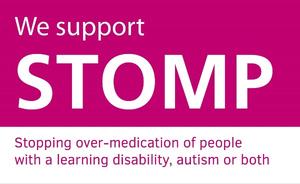
It is estimated that every day about 35,000 people with learning disabilities or autism are prescribed psychotropic medicines when they do not have a diagnosed mental health condition, often to manage behaviour which is seen as challenging. This includes medicines used to treat psychosis, depression, anxiety and sleep disorders. It also includes epilepsy medication when it is only used for its calming effect, rather than to treat epilepsy.
STOMP is about making sure people get the right medicine if they need it and that people get all the help they need in other ways as well. It is about encouraging people to have regular medication reviews, supporting health professionals to involve people in decisions and showing how families and social care providers can be involved. STOMP also aims to improve awareness of non-drug therapies and practical ways of supporting people whose behaviour is seen as challenging.
BDA Commitment and Action
We, as the BDA and Mental Health Specialist Group of the BDA support the STOMP pledge in the following ways:
All dietitians, particularly those working with people with learning disabilities and/or autism have an understanding of the aim and principles of STOMP.
- This will be done via regular communication via MHSG members and updates on the BDA and MHSG websites
- Information to be included in Dietetics Today
- Communication is also available on the NHS England website
Dietitians will consider the physical health of people they are working with, particularly when prescribed antipsychotic medications.
- Antipsychotic medications often have an impact on weight and metabolic health including an increased risk of diabetes therefore it is imperative that physical health is highlighted for consideration
- A high proportion of people with a learning disability do not attend their annual health checks therefore any opportunity to discuss and promote improved physical health should be utilised. Dietitians are key professionals to do this by supporting positive change to modifiable risk factors
Dietitians will be encouraged and supported to discuss concerns about people being over-medicated and work closely with people with a learning disability and/ or autism and relevant health professionals to stop over-medication.
- AHPs, including dietitians are often key team members when considering the wider picture therefore can be instrumental in highlighting people who may be over-medicated
More information
- Take a look at the specially created professional resources for health and care staff
-
 AHP STOMP Pledge 2018
AHP STOMP Pledge 2018
Check out at the Medication Pathway for families of people with learning disabilities, autism or both who are prescribed or may be prescribed psychotropic medication.
- Visit the NHS England website for more information on the STOMP initiative.
- Read the Learning Disability Professional Senate's own STOMP Pledge
- Take a look at some slides which outline STOMP's core messages

